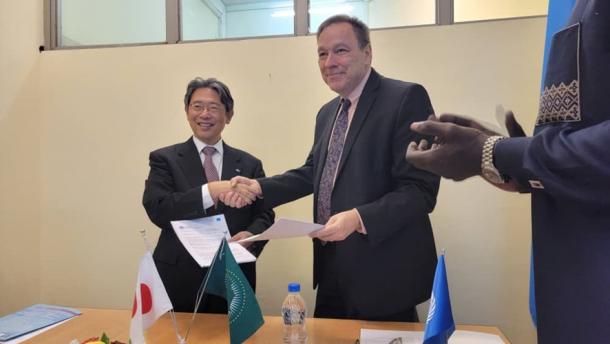Supporting Teachers and Learners in Contexts of Emergencies: Two New Japan-funded IICBA Projects
By Eyerusalem Azmeraw, Kasumi Moritani, and Quentin Wodon
February 14, 2024
Eyerusalem Azmeraw, Kasumi Moritani, and Quentin Wodon are with UNESCO IICBA.

On February 14, 2024, UNESCO IICBA and the Government of Japan entered into two new grant agreements (for a total of US$2.0 million) for projects supporting teachers and learners in contexts of emergencies. The signing ceremony was held at IICBA with the Permanent Representative of Japan to the African Union (AU), H.E. Ambassador Tsutomu Nakagawa. Both grants were approved under Japan’s 2023 yearly Supplementary Budget, with one grant supported by the Embassy of Japan in Ethiopia, and the other by the Mission of Japan to the African Union.
The project for Ethiopia focuses on improving the mental health and psychosocial well-being of both teachers and students in conflict-affected areas of northern Ethiopia. These regions have endured two years of conflict from 2020 to 2022, and despite the Agreement for Lasting Peace through a Permanent Cessation of Hostilities, the aftermath continues to pose significant challenges. Save the Children and the Ethiopia Education Cluster report that 2.3 million children remain out of school, and the conflict has resulted in more than two years of unpaid salaries for 22,500 teachers. The ramifications of conflict extend beyond the disruption of educational opportunities, impacting the mental and social well-being of communities. Millions of individuals are still living with the damage caused by the conflict. Teachers and learners have been affected by exposure to violence, lack of support, and extended periods without income or schooling. In such a context, schools should serve as a beacon of normalcy and recovery.
The first project, therefore, aims to integrate mental health and psychosocial support (MHPSS) in schools to facilitate the recovery process in Ethiopia. In recent years, IICBA has been engaged in research and training on mental health and psychosocial well-being through UNESCO’s programme Our Rights, Our Lives, Our Future (O3). IICBA’s work has included assessments of challenges faced by teachers, including the publication of an IICBA study on the psychosocial impact of COVID-19 on teachers, teacher educators, and learners and psychosocial support needs in selected countries and Knowledge Briefs on burnout among Kenyan school teachers and university lecturers. The findings have underscored the need for targeted support and contributed to the development of a training guide for teachers. IICBA has also provided training on those issues in a half dozen countries with results from beneficiaries suggesting positive outcomes. By leveraging these insights and resources and IICBA’s other initiatives on peacebuilding, the project will aim to contribute to the safe return of teachers and children to school in the affected regions.
The second project aims to create safe, supportive, and resilient learning environments in the Sahel, Central Africa, and East Africa amid conflicts and crises. The conflict that erupted in Sudan as well as the threats of attacks by non-state armed groups in the Sahel has affected educational opportunities. Analysis by IICBA of data from the Afrobarometer suggests that one-fifth of adults in Africa consider issues related to crime and security, political violence, political instability or division, or civil war to be among the top three issues in their country. In some countries such as Burkina Faso and Mali, the proportion is above half. Conflicts and insecurity may have especially harmful effects on girls, who are often already at a disadvantage for pursuing their education beyond primary school (see the Africa Teachers Report on girls’ education). Conflicts and insecurity have led to massive displacement, and threats to schools and teachers which add pressure on the already strained education systems.
The goal of the second project is to safeguard children’s rights to education, even as the education sector shoulders extra responsibilities amidst security crises. The initiative focuses on enhancing school safety by fostering a system-wide commitment to and awareness of school safety, including among school leaders and education officials. It is guided by global commitments, including the Safe School Declaration and the Comprehensive School Safety Framework 2022-2030. In implementing the project, UNESCO IICBA will work closely with the African Union’s International Centre for the Education of Girls and Women (AU/CIEFFA), a specialized institution of the African Union dedicated to the education of women and girls.
The support from the Government of Japan for these two projects reflects Japan’s pledge to humanitarian responses and a vision of education as transformative to create safe and quality learning environments for Africa's children and youth. This collaboration between the Government of Japan and IICBA also underscores the critical role of education in fostering peace, stability, and resilience in the most challenging contexts, and it builds on past successful projects implemented between 2017 and 2022 (see this IICBA study on lessons learned).

